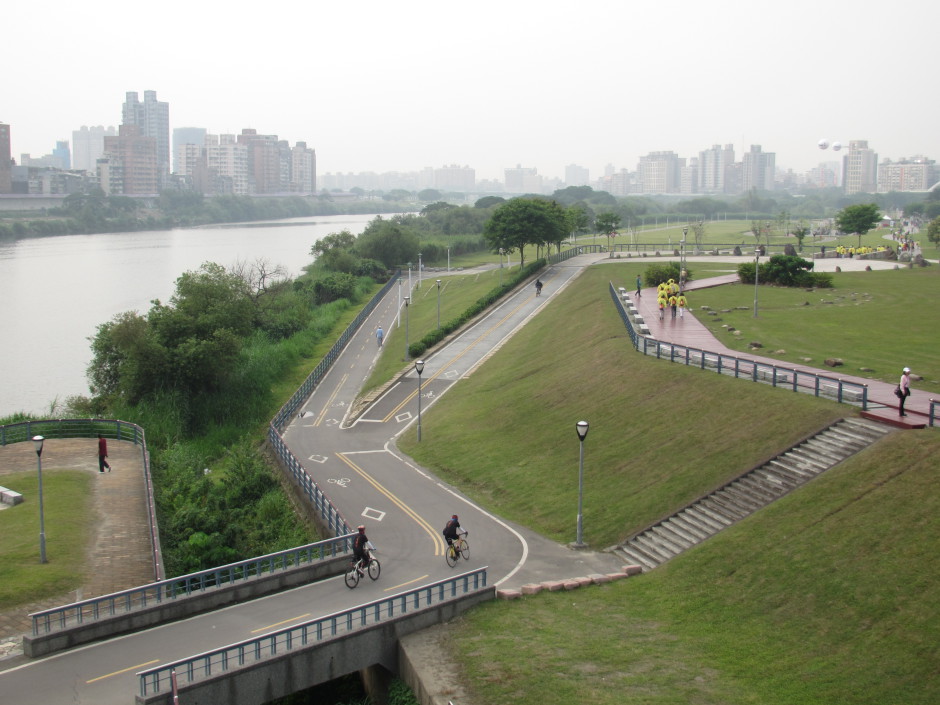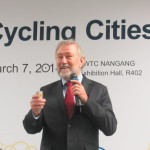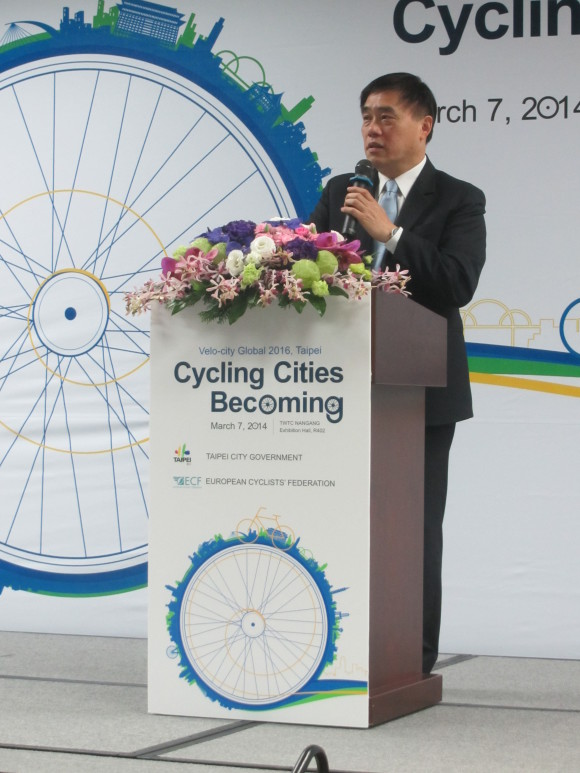
Velo-city Global series: Taipei on the rise
The Velo-city Global series of cycling conferences took a big step forward last Friday, 7th March 2014. As the countdown for Velo-city Global 2014 in Adelaide has began, ECF's managing team traveled to Taipei to attend the first workshop leading up to the following Velo-city Global in 2016. ECF Director of Development, Kevin Mayne, explains how the Velo-city series could transform Taipei, promote inter-city exchange and push for a holistic improvement in cycling conditions.
The first workshop in Taipei was a unanimous success. As ECF President Manfred Neun pointed out: “Our new partners in Taipei are not only keen to develop cycling in their city but they have shown they want to work with cities everywhere. Each Velo-city conference benefits from being part of a family, I have talked to many people who say they are afraid to miss one because the content is evolving so fast. The Taipei delegation to Adelaide will now be part of that strong momentum."
It certainly appears that Adelaide and Taipei will have a lot to talk about together and to share with colleagues from around the globe. Both are “climber cities” in cycling terms, working their way up from relatively low mode shares to establish cycling as mainstream mode of transport. However both have developed a strong leisure and sport cycling base in recent years that gives encouragement that there is a pent up demand for cycling.
Taipei's strengths showed at the workshop
Collaboration: At this first event the city already attracted support from the Commissioners for Transport for the six largest cities in Taiwan, representing a population of over 16 million people. ECF’s Manfred Neun set out a ten point cycling agenda for them to consider over the next two years which could return the human dimension to transport in any city. Also speaking was Lloyd Wright from the Asian Development Bank giving a strong regional perspective and two well-known Taiwanese figures from ECF’s academic network “Scientists for Cycling” Professors Jason Chang of National Taiwan University and Hsin Wen Chang of Chung Hua University.
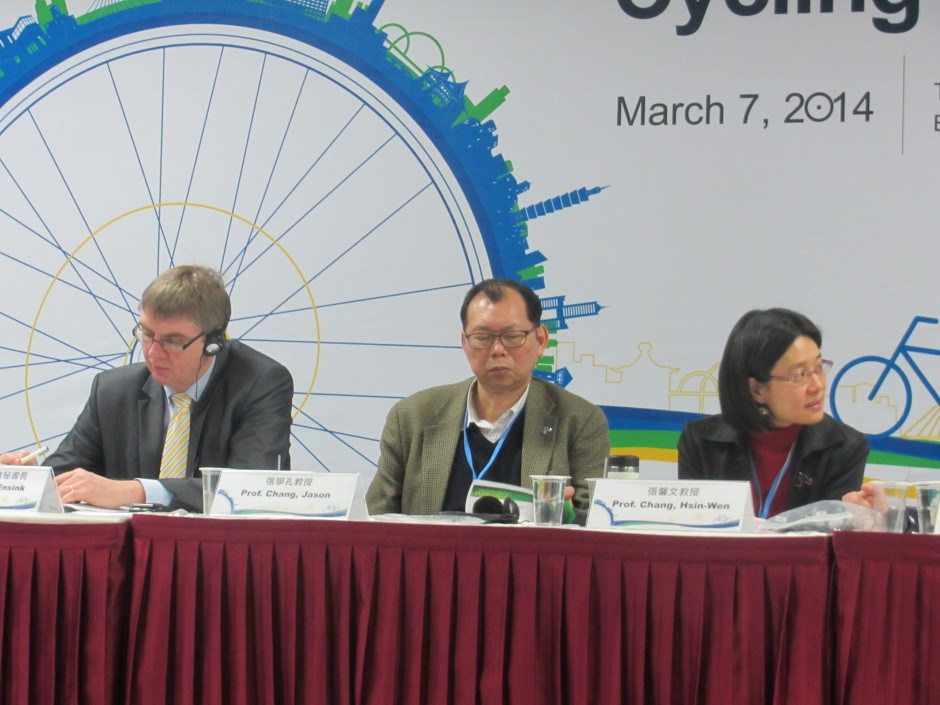 ECF Secretary General and Velo-city series Director Bernhard Ensink with Jason Chang Hsin and Wen Chang from the cities panel
ECF Secretary General and Velo-city series Director Bernhard Ensink with Jason Chang Hsin and Wen Chang from the cities panel
Commitment: This workshop was only the first in a series of events in the two year run up to Velo-city 2016. It was launched by the Mayor Hau Lung-Bin and well backed by his team and the large cities. The city also seems determined to show what it can do in the transport sector as it already has a very successful mass Rapid Transit (MRT or metro) and has achieved what few others have done in providing a single ticketing system for all its public transport including the fast growing Youbike public bike sharing system. These were political commitments driven from the top.
Industry leaders push for more leisure cycling...
Collaboration and commitment also sum up some of the cycling achievements of Taipei and indeed the whole of Taiwan in recent years. Up to 10 years ago the flagship of Taiwanese cycling was its world leading bicycle manufacturing sector but industry figures recognised that a lack of a cycling culture in home markets was undermining their capacity to “learn by doing”.
The first developments were partnerships in leisure and tourism with a mix of cycle touring routes, riverside cycle paths, mass participation rides and visible leadership by the top companies such as Giant. All this was a close collaboration with cities, tourism authorities and other public bodies. A national cycling master plan was created to support this change.
...but Velo-city is a opportunity to crystallize measures and coordinate change
Daily cycling is however a very different challenge to leisure but it is now one that the six cities seem committed to take on board with Taipei and the largest city of the south Kaohsiung in the vanguard.
The usual concerns of budget, space and safety were all highlighted at the workshop. They are all facing a real challenge of where to put their cycling infrastructure because the instinct is to grab space from the pavements and share space with pedestrians. In many places the sidewalks are broad enough to accommodate cycle paths but there is some way to go in public education for it to succeed.
Taipei cycling achievements
-In the last year cycling mode share in Taipei is up 30% to 5.5%, a figure many European capital cities still cannot match.
-The Youbike bike sharing is hitting usage figure that match with the world’s best, over 10 uses per bike per day.
-Almost uniquely for a low mode share city the cycling revolution in Taipei is female. Elsewhere in the world climber cities struggle to attract women cyclists until they have created safe segregated cycle networks. In Taipei women are 50% of the cycling population and a majority of Youbike users.
-Noticeably helmet wearing levels are low. This suggests a younger generation of women don't feel intimidated as they make cycling part of their daily lives. Middle aged men in lycra (MAMILS) they are not.
From Taipei to Adelaide: Infrastructure and other hot trends in cycling policy
What has pushed their thinking toward using pavements is not just cars. Like so many other Asian cities -and even some European ones- it is scooter culture that has been the response of the population to both congestion and limited incomes. On Taipei’s streets this is a highly challenging environment for the nervous cyclist. ECF gently encouraged our hosts to be bolder and think about taking space from cars, not pedestrians.
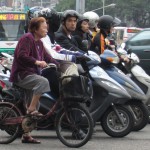 The mix of fast moving traffic on broad streets presents the other lesson that Taipei will want to learn and share with cities all over the world – junction design for cyclists. The latest thinking in infrastructure development is always a hot topic at Velo-city, Adelaide will just be the next step in an ongoing debate. In Taipei now most cyclists cross with pedestrians using the walk signals at traffic lights but the conflicts and accidents remain high. In ECF’s presentations and other speaker’s comments the successes of the Netherlands, Copenhagen and New York were mentioned as case studies for comparison
The mix of fast moving traffic on broad streets presents the other lesson that Taipei will want to learn and share with cities all over the world – junction design for cyclists. The latest thinking in infrastructure development is always a hot topic at Velo-city, Adelaide will just be the next step in an ongoing debate. In Taipei now most cyclists cross with pedestrians using the walk signals at traffic lights but the conflicts and accidents remain high. In ECF’s presentations and other speaker’s comments the successes of the Netherlands, Copenhagen and New York were mentioned as case studies for comparison
Our trip to Taipei was summed up by ECF’s Secretary General who is also Velo-city Series Director. Bernhard Ensink said “Velo-city series is in good hands, we have groups of cities with strong ambitions and distinct identities in Adelaide, Nantes and Taipei. Our new partner Taipei is already thinking hard about its agenda and will send a strong delegation to Adelaide. I am really looking forward to working with them all.”
What are you looking forward to at Velo-city 2014? Check out these links then drop us a post on our Facebook group!
About the author

Kevin Mayne is ECF’s Development Director. He was Chief Executive of CTC, the UK’s national cyclists’ organisation for 14 years. He was also a member of the Board of Cycling England where he was a specialist on cycle training issues. In both roles he helped create millions of pounds of funding for cycling. He became a Vice President of ECF in 2007 and stood down to join the ECF staff.
- Log in to post comments
Contact the author
Recent news!
Upcoming events
Contact Us
Avenue des Arts, 7-8
Postal address: Rue de la Charité, 22
1210 Brussels, Belgium

